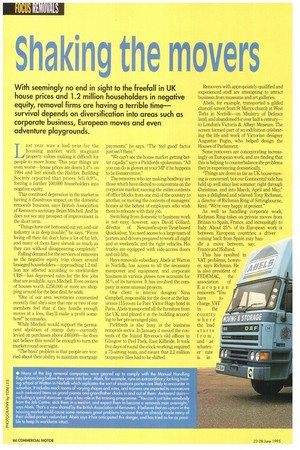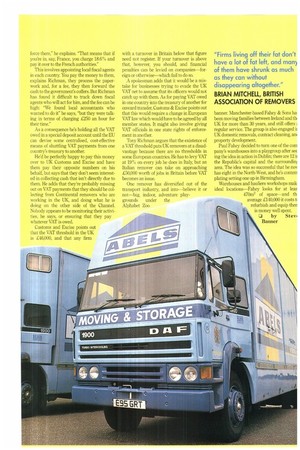Shaking the movers
Page 46

Page 47

If you've noticed an error in this article please click here to report it so we can fix it.
With seemingly no end in sight to the freefall in UK house prices and 1.2 million householders in negative equity, removal firms are having a terrible time— survival depends on diversification into areas such as corporate business, European moves and even adventure playgrounds.
-1,ast year was a bad year for the housing market with stagnant property values making it difficult for people to move home. This year things are even worse—house prices are down 1.4% on 1994 and last month the Halifax Building Society reported that prices fell 0,9°c, forcing a further 100,000 householders into negative equity This continued depression in the market is having a disastrous impact on the domestic removals business, says British Association of Removers secretary Brian Mitchell. And he does not see any prospect of improvement in the short term.
"Things have not bottomed out yet, and our industry is in deep trouble," he says. "Firms living off their fat don't have a lot of fat left, and many of them have shrunk as much as they can without disappearing completely" Falling demand for the services of removers as the negative equity trap closes around besieged householders—approaching 1.2 million are affected according to stockbroker UBS—has depressed rates for the few jobs that are available, says Mitchell. Even owners of houses worth £250,000 or more are shopping around for the best deal, he adds.
"One of our area secretaries commented recently that she's sure that one or two of our members feel that if they handle enough moves at a loss, they'll make a profit somehow!" he remarks.
While Mitchell would support the permanent abolition of stamp duty—currently levied on purchases above £60,000—he does not believe this would be enough to turn the market round overnight.
"The basic problem is that people are worried about their ability to maintain mortgage payments," he says. "The 'feel good' factor just isn't there."
"We can't see the house market getting better rapidly," says a Pickfords spokesman. "All you can do is glower at your MP if he happens to be Conservative."
The removers who are making headway are those which have elected to concentrate on the corporate market; moving the entire contents of office blocks from one end of the country to another, or moving the contents of managers' homes at the behest of employers who wish them to relocate with their job.
Switching from domestic to business work is not easy, however, says David Collard, director of Newcastle-upon-Tyne-based Quicksilver. You need access to a large team of porters and drivers prepared to work all night and at weekends, and the right vehicles His trucks are equipped with side-access doors and tail-lifts.
Hays removals subsidiary Abels at Watton in Norfolk, has access to all the necessary manpower and equipment, and corporate business in various guises now accounts for 51% of its turnover. It has involved the company in some unusual projects.
One client is interior designer Nina Campbell, responsible for the decor at the luxurious 115-room Le Parc Victor Hugo hotel in Paris. Abets transported all the furniture from the UK, and placed it in the building according to her pre-arranged plan.
Picicfords is also busy in the business removals sector. In January it moved the contents of the Inland Revenue's old offices in Glasgow to Peel Park, East Kilbride. It took five days of round.the-clock working, required a 75-strong team, and meant that 2.2 million taxpayers' files had to be shifted. Removers with appropriately qualified and experienced stAff are attempting to attract business from museums and art galleries.
Abels, for example, transported a gilded chancel screen from St Marys church at West Tofts in Norfolk—on Ministry of Defence land, and abandoned for over half a century— to London's Victoria & Albert Museum. The screen formed part of an exhibition celebrating the life and work of Victorian designer Augustus Pugin, who helped design the Houses of Parliament Some removers are concentrating increasingly on European work, and are finding that this is helping to counterbalance the problems they're experiencing domestically.
"Things are down as far as UK house-moving is concerned, but our Continental side has held up well since last summer; right through Christmas, and into March, April and May" says a delighted and relieved Tony Richman, a director of Richman Ring of Sittingbourne, Kent. "We're very happy at present."
As well as handling corporate work, Richman Ring takes on private moves from Britain to Spain, France, and increasingly to Italy. About 25% of its European work is between European counties; a driver coming back from Spain may handle a move between, say, France and Holland.
This has resulted in VAT problems, however, says Richman. He is also president of FEDEMAC, the association of European removers. "You have to charge VAT in the country where the load starts from, and at whatever rate is in
force there," he explains. "That means that if you're in, say, France, you charge 18.6% and pay it over to the French authorities."
This involves appointing local fiscal agents in each country. You pay the money to them, explains Richman, they process the paperwork and, for a fee, they then forward the cash to the government's coffers. But Richman has found it difficult to track down fiscal agents who will act for him, and the fee can be high: "We found local accountants who wanted to do it" he says, "but they were talking in terms of charging £250 an hour for their time."
As a consequence he's holding all the VAT owed in a special deposit account until the EU can devise some centralised, cost-effective means of shuttling VAT payments from one country's treasury to another.
He'd be perfectly happy to pay this money over to UK Customs and Excise and have them pay their opposite numbers on his behalf, but says that they don't seem interested in collecting cash that isn't directly due to them. He adds that they're probably missing out on VAT payments that they should be collecting from Continental removers who are working in the UK, and doing what he is doing on the other side of the Channel. Nobody appears to be monitoring their activities, he says, or ensuring that they pay whatever VAT is owed.
Customs and Excise points out that the VAT threshold in the UK is £46,000, and that any firm with a turnover in Britain below that figure need not register. If your turnover is above that, however, you should, and financial penalties can be levied on companies—foreign or otherwise—which fail to do so.
A spokesman adds that it would be a mistake for businesses trying to evade the UK VAT net to assume that its officers would not catch up with them. As for paying VAT owed in one country into the treasury of another for onward transfer, Customs & Excise points out that this would require a change in European VAT law which would have to be agreed by all member states. It might also involve giving VAT officials in one state rights of enforcement in another.
Tony Richman argues that the existence of a VAT threshold puts UK removers at a disadvantage because there are no thresholds in some European countries. He has to levy VAT at 19°0 on every job he does in Italy, but an Italian remover can take on approaching £50,000 worth of jobs in Britain before VAT becomes an issue.
One remover has diversified out of the transport industry, and into—believe it or not—big, indoor, adventure play
grounds under the Alphabet Zoo
banner. Manchester-based Fahey & Sons ha been moving families between Ireland and th UK for more than 30 years, and still offers regular service. The group is also engaged i: UK domestic removals, contract cleaning, an property development.
Paul Fahey decided to turn one of the con pany's warehouses into a playgroup after se( ing the idea in action in Dublin; there are 12 the Republic's capital and the surroundin. area. The idea was so successful that he no has eight in the North-West, and he's conten plating setting one up in Birmingham.
Warehouses and hauliers workshops mak ideal locations—Fahey looks for at leaE 470m2 of space—and th average £140,000 it costs t refurbish and equip ther is money well spent. CI by Stev Banner




































































































